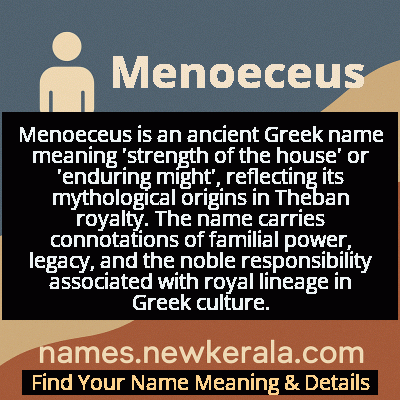Menoeceus Name Meaning & Details
Origin, Popularity, Numerology Analysis & Name Meaning of Menoeceus
Discover the origin, meaning, and cultural significance of the name MENOECEUS. Delve into its historical roots and explore the lasting impact it has had on communities and traditions.
Name
Menoeceus
Gender
Male
Origin
Greek
Lucky Number
1
Meaning of the Name - Menoeceus
Menoeceus is an ancient Greek name meaning 'strength of the house' or 'enduring might', reflecting its mythological origins in Theban royalty. The name carries connotations of familial power, legacy, and the noble responsibility associated with royal lineage in Greek culture.
Menoeceus - Complete Numerology Analysis
Your Numerology Number
Based on Pythagorean Numerology System
Ruling Planet
Sun
Positive Nature
Leaders, ambitious, highly driven, self-reliant, innovative.
Negative Traits
Overly aggressive, domineering, impatient, selfish.
Lucky Colours
Red, orange, gold.
Lucky Days
Sunday.
Lucky Stones
Ruby, garnet.
Harmony Numbers
2, 3, 9.
Best Suited Professions
Entrepreneurs, managers, engineers.
What People Like About You
Courage, determination, leadership.
Famous People Named Menoeceus
Menoeceus of Thebes
Mythological King
Patriarch of Theban royal family, father of Jocasta and Creon
Menoeceus (son of Creon)
Mythological Hero
Sacrificed himself to save Thebes from destruction
Menoeceus of Athens
Philosopher
Early Epicurean philosopher and student of Epicurus
Name Variations & International Equivalents
Click on blue names to explore their detailed meanings. Gray names with will be available soon.
Cultural & Historical Significance
The name gains additional cultural weight through his grandson, another Menoeceus who voluntarily sacrificed his life to save Thebes. This act, dramatically portrayed in Euripides' 'Phoenician Women', transforms the name into a symbol of ultimate civic virtue and self-sacrifice. In classical Greek culture, this dual representation—as both royal ancestor and heroic martyr—made Menoeceus a name that embodied the complex relationship between individual destiny and community responsibility. The name continues to be studied in classical literature courses and appears in modern adaptations of Greek myths, maintaining its cultural relevance as an example of how ancient names carry layered historical and thematic significance.
Extended Personality Analysis
The name Menoeceus suggests a personality marked by profound seriousness, deep familial commitment, and a strong sense of historical consciousness. Individuals with this name are often perceived as carrying the weight of tradition and legacy, potentially exhibiting the gravitas of someone aware of their place in a larger narrative. They typically demonstrate leadership qualities combined with a philosophical temperament, showing both the capacity for command and the wisdom to understand the consequences of power. The mythological associations indicate someone who takes responsibility seriously and may be willing to make significant personal sacrifices for principles or community welfare.
This name also implies intellectual depth and cultural sophistication, with potential interests in history, philosophy, or classical studies. Menoeceus-bearing individuals might display analytical thinking patterns and a respect for ancient wisdom traditions. The tragic elements in the name's mythology suggest a personality that understands suffering as part of the human condition, potentially making them empathetic and thoughtful in their relationships. There's often a nobility of character implied—not in the sense of arrogance, but in the classical understanding of nobility as responsibility, honor, and service to something larger than oneself. The dual mythological references create a complex personality profile combining authority, sacrifice, and deep connection to heritage.
Modern Usage & Popularity
In contemporary naming practices, Menoeceus remains an extraordinarily rare choice, primarily confined to academic families, classical scholars, or those with specific interest in Greek mythology. The name has never gained mainstream popularity and doesn't appear in modern baby name databases or popularity charts. Its usage is mostly symbolic or academic rather than practical, though it occasionally appears in Greece itself as a traditional but uncommon selection. The name's complexity and strong mythological associations make it challenging for everyday use in most cultures, maintaining its status as a specialist or heritage name. In recent years, with growing interest in mythological names, Menoeceus might see slightly increased recognition but is unlikely to become popular due to its length and strong tragic associations.
Symbolic & Spiritual Meanings
Menoeceus symbolizes the intricate relationship between individual destiny and familial legacy, representing how ancestral actions create ripples through generations. The name embodies the classical concept of fate as an inescapable force that shapes human lives, while also representing the nobility found in accepting one's destined role. Symbolically, it speaks to the idea that true strength often involves sacrifice for the greater good, as demonstrated by the younger Menoeceus' voluntary death for Thebes. The name carries connotations of tragic wisdom—the understanding that knowledge of future suffering doesn't necessarily enable escape from it, but can lend dignity to how one faces inevitable challenges.
Additionally, Menoeceus represents the foundation upon which great stories are built—the often-overlooked ancestral figures whose choices create the conditions for legendary narratives to unfold. The name symbolizes the quiet power of lineage and the way family histories both constrain and empower subsequent generations. In a broader sense, Menoeceus serves as a metaphor for how personal identity is always contextual, shaped by historical circumstances and familial patterns that precede individual existence. The dual mythological references create a rich symbolic tapestry combining establishment, preservation, sacrifice, and the enduring power of names to carry complex cultural meanings across millennia.

